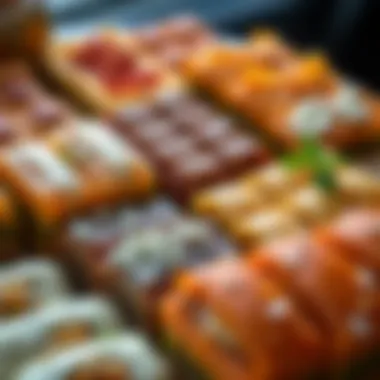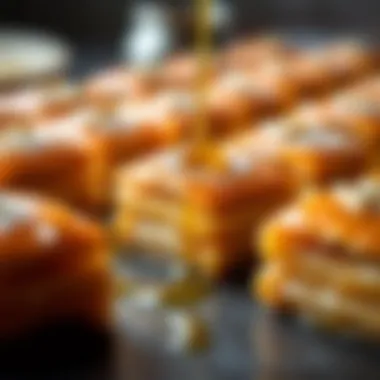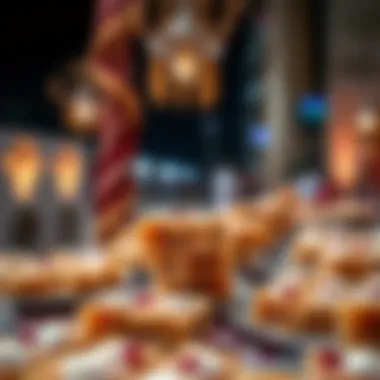Discovering the Best Baklava in Dubai's Culinary Scene


Intro
Baklava, the sweet, flaky pastry drenched in syrup and layered with nuts, has a special place in the heart of Dubai’s culinary scene. It’s not simply a dessert but a symbol of cultural exchange that reflects the city’s rich history. As Dubai welcomes people from diverse backgrounds, baklava serves as a culinary bridge connecting them to traditional Middle Eastern flavors.
In exploring Dubai's baklava culture, we will map out not just the historical aspects of this beloved dessert but also take a look at the modern trends and variations you can find in the bustling streets and upscale cafes. It’s this melange of flavors, textures, and techniques that makes baklava a staple in Dubai, and a must-try for anyone visiting the city. The article also sheds light on where to find the best versions, allowing you to fully immerse yourself in this flavorful journey.
Let’s dive into the flavors and stories behind each bite, understanding why baklava maintains its hold over both residents and visitors alike. Each piece tells a tale of tradition, culinary craftsmanship, and the sweet life here in Dubai.
Preamble to Baklava
Exploring the cherished dessert of baklava reveals a tapestry interwoven with history, culture, and exceptional culinary artistry. For Dubai's multicultural landscape, baklava embodies a sweet delight that resonates with many, offering more than mere indulgence; it is a symbol of celebration, heritage, and shared experiences.
This section sets the stage for an immersive journey into baklava, its significance in various contexts, and the captivating reasons behind its esteemed place in Dubai's gastronomic hierarchy.
Historical Significance of Baklava
Baklava's origins appear somewhat murky, with debates sprouting like wildflowers across several cultures. However, its roots, likely tracing back to the Ottoman Empire, ground baklava firmly in history. While recipes have changed and adapted over centuries, the essence of baklava – pastry layered with nuts and drenched in syrup – has remained a constant.
One can liken baklava to a cultural artifact, reflecting the socio-political shifts and culinary exchanges between civilizations. The long-standing tradition of preparing baklava during festive occasions like holidays and weddings underscores its festive resonance. Each bite tells tales of craftsmanship passed through generations, making it a historical cornerstone in Middle Eastern kitchens.
Baklava in Middle Eastern Culture
In Middle Eastern culture, baklava holds an esteemed status, serving not just as a dessert but as an emblem of unity and hospitality. Often presented during social gatherings or family celebrations, it embodies the spirit of community and shared experience. Various regions put forth their own twists, using diverse nuts and particular spices that infuse the dessert with local flavor—all unique little flair and charm.
As you delve deeper into the cultural fabric of the Middle East, you'll notice the transformative power of baklava. It's not merely a sweet treat; it’s a conversation starter. Different variations signify diverse customs, making each bite a step into a living history, inviting both residents and visitors to partake in an unbroken lineage of tradition. The cultivation of these flavors enriches Dubai's landscape, threading a sense of togetherness among its diverse populace.
"Baklava isn't just dessert; it's a shared experience that ties the community through generations."
In summary, understanding the significance of baklava within this rich cultural context offers a lens through which to view not only a dessert but the very essence of Middle Eastern society itself.
The Anatomy of Baklava
When one dives into the world of baklava, it’s essential to understand the intricate layers of flavors and textures that define this renowned pastry. Not only is baklava a feast for the taste buds, but it also serves as a cultural bridge connecting various traditions and time-honored recipes across the globe. In this section, we’ll unpack the elements that contribute to the quality of baklava, examine the different variations and styles, and appreciate why it is still beloved in Dubai.
Ingredients that Define Quality
The cornerstone of any great baklava lies in its ingredients. The key elements typically include:
- Phyllo Pastry: Thin layers of dough that create the crispiness characteristic of baklava. Quality phyllo can make or break the dessert.
- Nuts: Traditionally, walnuts or pistachios are used. Each nut brings its distinct flavor profile, with pistachios lending a touch of earthiness.
- Sugar Syrup: This sweet component binds the layers together and each region has its variation, often spiced with cinnamon or infused with rosewater.
- Butter: The use of clarified butter, known for its rich flavor, helps achieve that golden hue and flaky texture.
When these ingredients are combined with craftsmanship and care, the result is a baklava that tells a story of heritage and culinary excellence. Many bakers in Dubai pride themselves on using only the freshest ingredients, allowing the flavors to shine through in their creations.
Variations and Styles
Baklava isn’t a one-size-fits-all dessert; its variations and styles reflect the diversity of the regions producing it. Notably, two approaches stand out: classic recipes and modern twists.


Classic Recipes
Classic recipes anchor themselves in tradition, often passed down through generations. These recipes feature the traditional combinations of nuts, phyllo, butter, and syrup. The key characteristic of classic baklava is its simplicity yet profound flavor, which captivates audiences with its authenticity.
A defining feature of classic recipes is the use of local nuts unique to their regions. For instance, Turkish baklava often relies heavily on pistachios for its signature taste, while Greek baklava might lean toward walnuts. This classic style is a popular choice in Dubai, especially among those seeking a taste of history. However, one has to consider the availability of quality ingredients, which might differ in today's modern setup.
Modern Twists
As culinary creativity knows no bounds, modern twists on baklava have emerged, allowing chefs to reinvent traditional recipes. This could mean incorporating unconventional flavors like chocolate, matcha, or even salted caramel. The advantage here lies in appealing to a broader audience, particularly younger diners drawn to innovation.
Modern baklava captures attention not just through flavor but also in presentation, with some versatile establishments offering baklava in new formats, such as cups or popsicles. However, while these twists are enticing, they may lack the historical richness that classic varieties provide, creating a conversation point about authenticity versus creativity in contemporary culinary scenes.
"To embrace tradition is to honor the essence of a dish, yet to adapt it is to celebrate its evolution."
Thus, whether one opts for a classic slice or an inventive modern iteration, there is a rich tapestry of flavors waiting to be uncovered in Dubai’s baklava scene.
Top Establishments for Baklava in Dubai
In the vibrant culinary scene of Dubai, baklava holds a special place. It’s not just a dessert; it’s an experience rooted in tradition and culture. When it comes to savoring the best baklava, knowing where to go is vital. The top establishments in Dubai not only serve delicious baklava but also reflect the rich heritage and innovation surrounding this beloved dish. This section delves into the heritage bakeries and contemporary cafés that showcase baklava in all its glory, making them essential stops for anyone eager to indulge.
Heritage Bakeries
Legacy of Authenticity
When you step into a heritage bakery in Dubai, you’re often met with a sense of nostalgia and authenticity that is hard to replicate. These bakeries pride themselves on preserving traditional recipes passed down through generations. The legacy of authenticity lies in their commitment to using age-old techniques, ensuring that the baklava tastes as it would have decades ago. For many customers, the allure of these bakeries stems from the connection to the past, giving a taste of cultural history with every bite.
Key characteristics of these establishments include:
- Traditional Ingredients: Sourcing quality ingredients is paramount; many bakeries insist on local nuts and smooth honey to guarantee freshness.
- Time-honored Techniques: The methods used are often labor-intensive. This results in layers that are perfectly thin and crispy, a hallmark of authentic baklava.
One unique feature of these bakeries is their special focus on seasonal offerings and regional specialties, which can vary depending on the time of year. However, their commitment to authenticity can sometimes lead to limited availability of certain flavors, thus requiring customers to visit frequently.
Traditional Baking Methods
The traditional baking methods employed in these heritage bakeries are an art form in themselves. From hand-rolling the dough to carefully layering the nuts and syrup, there's a meticulous process that ensures quality. This dedication to craft results in a baklava that’s not only visually appealing but also bursting with flavor.
What characterizes these methods includes:
- Handcrafted Techniques: Many steps are done by hand, allowing for individual care and attention. Each piece feels unique, rather than mass-produced.
- Slow Baking: The quality of baking plays a crucial role in flavor development. Slow baking allows the flavors to meld beautifully, enhancing the overall taste experience.
An advantage of these traditional methods is that they foster a sense of connection between the customer and the bakery staff, creating a community feeling. However, the drawback may be that such methods can also lead to higher prices, a factor to consider in today’s fast-paced market.
Contemporary Cafés
Fusion Flavors
In contrast to the heritage bakeries, contemporary cafés in Dubai often take a modern twist on traditional baklava, introducing fusion flavors that delight adventurous palates. The idea is to blend the familiar with the unexpected, appealing to both local and international tastes. These cafés are often bustling spots where creativity reigns supreme, and baklava becomes more than just a dessert; it becomes a canvas for culinary innovation.


Characteristics of fusion baklava may include:
- Unique Flavors: Incorporation of ingredients like matcha, salted caramel, or even tropical fruits, transforming traditional baklava into a novel delight.
- Visual Presentation: Modern cafés often prioritize aesthetics, making their baklava as Instagram-worthy as it is delicious.
A special feature of these spots is their ability to cater to diverse dietary preferences, offering vegan or gluten-free versions of baklava. However, while fusion flavors attract many, purists may be left longing for the classic taste.
Artisan Touch
The artisan touch found in many of Dubai’s contemporary cafés gives baklava a personal flair. Here, bakers and chefs often experiment with textures and flavors, producing a baklava that’s layered in surprising ways. This creativity goes beyond mere flavor; it’s about how the dessert interacts with all senses.
Key defining aspects of cafés that highlight an artisan touch include:
- Local Ingredients: Many cafés focus on using seasonal or locally-sourced ingredients, giving their creations a distinct personality.
- Innovative Recipes: Chefs in this domain continually redefine what baklava can be, often resulting in limited-edition flavors that draw customers in for a unique experience.
A benefit of this artisan approach is that it draws a crowd eager for new experiences, fostering an environment of culinary exploration. However, it can sometimes lead to a disconnect with the traditional roots that baklava fans cherish.
"The evolving landscape of baklava in Dubai embodies a blend of tradition and modernity, where each bite tells a story of cultural exchange."
By exploring these various establishments, one gains not just a taste for baklava but also an understanding of the changing dynamics in Dubai’s food scene. Whether you seek authentic heritage or innovative flavors, there is a piece of baklava waiting to be discovered.
Factors Influencing Baklava Quality
When it comes to baklava, its quality can make or break the experience. In Dubai, a city that prides itself on high culinary standards, understanding what influences the quality of baklava is crucial for both bakers and consumers alike. The meticulousness in selection, preparation, and presentation speaks volumes about a bakery’s dedication. Several key factors play a significant role in creating that perfect layer of flaky pastry coupled with the rich sweetness of syrup and nuts.
Freshness of Ingredients
Freshness is a non-negotiable when it comes to crafting top-notch baklava. The use of fresh ingredients elevates the flavor profile significantly. Think about it: fresh nuts, especially pistachios or walnuts, provide a crunch and rich taste that stale ones simply cannot match.
- Nuts: Ideally, they should be sourced from reliable suppliers known for quality. Freshly crushed nuts add an earthy richness, while rancid nuts can ruin the sweet experience altogether.
- Phyllo Dough: Fresh phyllo dough is also essential. When it's made in-house, it retains its elasticity and texture—key elements that affect layering and crispness. Meanwhile, pre-packaged sheets can be dry and brittle, leading to a subpar product.
- Syrup: The syrup, usually made from sugar, water, and sometimes infused with floral notes like rose water or orange blossom, should always be prepared fresh. Old syrup can lead to an overly sugary or lackluster taste.
In a bustling place like Dubai, where flavors collide from various cultures, freshness isn’t just a standard; it’s an expectation.
Baking Techniques
Next on the list, we have baking techniques, which wield significant power over the final product. It's about more than just putting dough in an oven; it breathes life into the baklava, turning simple ingredients into something extraordinary.
- Layering: Crafting baklava demands precision in layering the phyllo dough. Each layer should be brushed with melted butter to ensure that it bakes to a perfect golden-brown color. Improper buttering may result in soggy or uneven layers.
- Baking Temperature: The temperature at which baklava is baked is also pivotal. Too hot, and you risk burning the edges; too cool, and it won’t crisp up properly. An oven calibrated for the right temperature creates that sought-after contrast of crunchy outside and soft, flavorful filling inside.
- Cooling Process: Once baked, how baklava is cooled is equally important. Placing it in a room-temperature environment allows the syrup to be absorbed evenly, enhancing the flavors throughout. Rushing this process can lead to uneven sweetness.
In this city, where culinary art is highly regarded, traditional baking practices often mixed with modern techniques create a unique fusion that appeals to a discerning palate.
"Quality is never an accident; it is always the result of intelligent effort." – John Ruskin
Thus, the next time you sit down to enjoy a piece of baklava, consider the hard work that went into ensuring quality. Whether it’s the freshness of ingredients or the baker's technique, each bite is a testament to dedication and passion for this time-honored dessert.
Taste Profiles of Baklava
Understanding the taste profiles of baklava is crucial when delving into this beloved dessert, especially in a vibrant culinary hub like Dubai. It's not just about sweetness; it's a dance of textures and flavors that captures the essence of baklava. Each bite reveals layers that tell their own story. To do justice to this dessert, we must explore how balancing sweetness and flavor can transform baklava from a simple treat into a gourmet experience.


Balancing Sweetness and Flavor
In many ways, the hallmark of baklava lies in the delicate balance of sweetness and flavor. Too often, people encounter desserts that overwhelm the palate with sugar, masking the intricate flavors that are inherent in quality baklava. The line is finer than one might assume.
- Sweetness: Traditional baklava uses syrup made from sugar and water, sometimes flavored with lemon juice or rose water. The right amount of sweetness enhances the experience but never overshadows other taste components.
- Flavor Components: The nutty undertones from walnuts or pistachios play a robust role. You might even find a hint of cinnamon or cardamom, which can elevate the dessert into a sensory delight.
The Role of Baklava in Celebrations
Baklava is more than just a dessert; it's a sweet symbol of unity and festivity, interwoven in the cultural and social fabric of Dubai. Understanding the role of baklava in celebrations provides insight into how food can transcend simple nourishment, becoming a vessel for tradition, emotion, and connection among people. Its presence in key seasons and events showcases its significance beyond mere taste and aesthetics, embodying shared experiences and communal joy.
Cultural Festivals
Baklava takes center stage during various cultural festivals, such as Eid al-Fitr and Ramadan. During these periods, families and communities come together to celebrate, and baklava serves as an essential element of the festive spread. Its layers of thin pastry and rich fillings not only satisfy sweet cravings but also symbolize abundance and generosity.
- Eid al-Fitr: After a month of fasting, the first day of Eid is marked by lavish meals featuring baklava. Friends and family exchange platters filled with these golden, syrup-dripping delights, emphasizing the joy of sharing.
- Ramadan Iftar: Iftar – the evening meal to break the daily fast – often includes baklava, serving as a sweet note to end the day. It is not uncommon to find people sharing this dessert with neighbors, reinforcing community spirit.
The intricate preparation of baklava, sometimes taking hours, reflects the care and effort communities put into their celebrations. Sharing baklava during these festive occasions also tells stories that bind generations; recipes are passed down, creating a legacy that honors both cuisine and culture.
Family Gatherings
In addition to cultural festivals, baklava plays a significant role in family gatherings, creating an atmosphere of warmth and togetherness. From casual Sunday dinners to big family reunions, this dessert finds its way onto tables across Dubai, often as a sweet centerpiece.
Baklava enhances the experience of unity, serving as a conversation starter and a nostalgic reminder of shared history. Families cherish the act of preparing baklava together, where each member contributes in some way, whether it's rolling the dough or choosing the perfect nuts. This shared effort fosters bonds and creates lasting memories.
- Celebrations of Milestones: Important life events like weddings, birthdays, and anniversaries often feature baklava as a customary treat. It epitomizes the joys of these moments, sweetening them further.
- Comfort Food: On quieter occasions, when family gathers to reflect or simply enjoy each other's company, baklava offers a sense of comfort. Its rich flavors evoke familiarity and affection, making it more than just a dessert.
"In every bite of baklava, there is a story that unfolds – a tale of love, community, and joy, shared among those who have gathered around the table."
The essential role of baklava in both cultural festivals and family gatherings demonstrates how this dessert has carved itself a cozy nook in the hearts and homes of Dubai. Ultimately, the sweetness of baklava is not just in its ingredients, but in the moments it helps create and the connections it solidifies, allowing the rich heritage of this delightful pastry to thrive in the bustling dynamic of Dubai.
The End: The Legacy of Baklava in Dubai
Baklava, with its intricate layers of pastry and rich flavor, conveys a profound legacy in Dubai's culinary world, symbolizing the fusion of cultures and traditions. This dessert goes beyond mere sweetness; it serves as a cultural ambassador, representing the city’s historical connections and evolving gastronomy.
As we wrap up this exploration of baklava, it becomes clear why it captivates the hearts of both locals and visitors. It is not just about tasting a confectionery delight; it's about experiencing a piece of history woven into the fabric of Dubai’s social gatherings and celebrations. Each bite unfurls stories of the past, celebrating the meticulous artisanship involved in its creation.
Baklava as a Culinary Experience
The act of enjoying baklava is indeed a culinary experience, steeped in tradition and craftsmanship. It's not merely about indulging one's sweet tooth, but about savoring the handiwork of bakers who dedicate their lives to this art. The contrasting textures—the crispy phyllo, the crunchy nuts, and the sticky syrup—create a delightful harmony that dances across the palate. Each establishment brings its unique spin, adding local touches that mark its identity within Dubai's bustling food scene.
For instance, places like Al Hallab and Baker & Spice have mastered the art of layering flavors, ensuring that their baklava is both traditional and contemporary. Their recipes might be passed down through generations, keeping the legacy alive while integrating innovative twists, such as infusing local spices or flavors like saffron. This layered history and the artistry involved in making baklava forge a memorable taste experience that beckons people to return, time and again.
Future Trends in Dubai's Baklava Scene
Looking ahead, the baklava scene in Dubai is poised for exciting transformations. As the city embraces a more global perspective, one might sense a growing influence from the latest culinary trends. For example, the rise of health-conscious eating will likely prompt bakers to explore alternatives in ingredients—think sugar substitutes or gluten-free phyllo, appealing to a broader audience.
Moreover, expect a ramp-up in fusion creations where baklava meets quintessential local sweets or international desserts. Imagine a baklava cheesecake or even baklava-inspired pastries served in upscale cafés, allowing the time-honored dessert to fit snugly into modern dining experiences.
The influence of social media cannot be overlooked. Visual appeal will drive bakers to refine not only the taste but also the presentation of their baklava, turning these treats into Instagram-worthy creations that enhance their desirability. In essence, as Dubai continues to evolve, so too will its beloved baklava, ensuring its cherished place within the ever-expanding tapestry of the city's culinary offerings.
"Baklava isn't just dessert; it's a story told through layers of history, flavor, and culture that binds together the old and the new."
As we conclude our journey through the legacy and culinary significance of baklava in Dubai, it becomes evident that this dessert is much more than a treat. It is an experience that invites you to explore, appreciate, and savor the rich history and future of one of the most beloved delicacies in the world.











